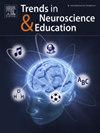结合与四年级学生数学成绩相关的认知和情感因素:心理网络分析研究
IF 3
Q2 NEUROSCIENCES
引用次数: 0
摘要
背景数学的发展是一个复杂而多维的过程,有许多不同的相互作用的预测因素。本研究采用网络方法研究了数学成绩与相关人口统计学变量、一般领域变量和特定领域认知变量以及情感变量之间的关系。采用心理网络分析法来研究认知变量(即符号比较、非符号比较、排序、转移、抑制、言语和视觉空间更新、流体推理)、情感变量(即数学焦虑和数学自我概念)和人口统计学变量(即社会经济地位、年龄和性别)之间的关系。结果该网络显示出三个子群,其中特定领域的认知和情感因素与算术流利性和数学成绩有关。结论网络分析可以加深我们对儿童数学成绩相关因素的理解,从而有可能开发出更加个性化的数学干预方法。本文章由计算机程序翻译,如有差异,请以英文原文为准。
Combining cognitive and affective factors related to mathematical achievement in 4th graders: A psychological network analysis study
Background
Development of mathematics is a complex and multidimensional process with many different interacting predictors. This study examined the relations between math achievement and related demographic, domain-general and domain-specific cognitive, and affective variables by using a network approach.
Methods
Data were gathered from 201 Dutch fourth grade children. A psychological network analysis was used to examine how cognitive variables (i.e. symbolic comparison, non-symbolic comparison, ordering, shifting, inhibition, verbal and visuospatial updating, fluid reasoning), affective variables (i.e. math anxiety and math self-concept), and demographic variables (i.e. SES, age, and gender) are interrelated with arithmetic fluency and mathematical achievement.
Results
The network showed three subclusters, with domain-specific cognitive and affective factors relating to arithmetic fluency and math achievement. Domain-general and demographic factors were not related to math achievement.
Conclusion
Network analysis can enhance our understanding of factors relating to mathematical achievement in children, potentially leading to more personalized approaches to math interventions.
求助全文
通过发布文献求助,成功后即可免费获取论文全文。
去求助
来源期刊

Trends in Neuroscience and Education
NEUROSCIENCES-
CiteScore
6.30
自引率
6.10%
发文量
22
审稿时长
65 days
 求助内容:
求助内容: 应助结果提醒方式:
应助结果提醒方式:


